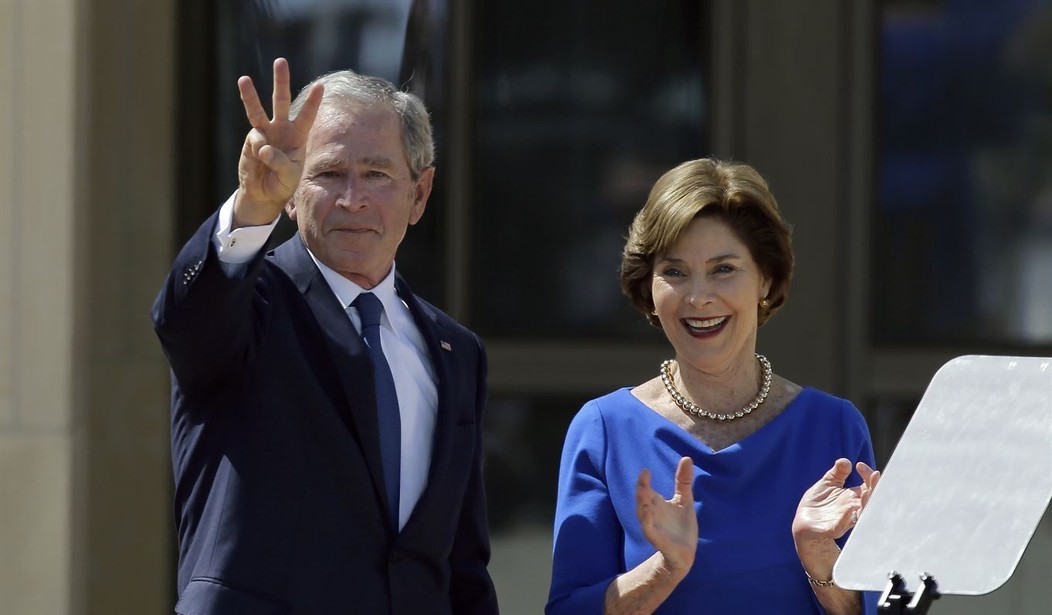The death of former president George Herbert Walker Bush created a calm oasis of civil discourse, if only for a couple of minutes. It was appropriate to salute this man's kindness and statesmanship, even if you disagreed with him passionately, as many conservatives did.
And yet, it's a bit odd that pundits suddenly remember the kinder, gentler noblesse oblige of Bush's presidency. This from the same industry that mocked him during his vice presidential days as having put "his manhood in a blind trust," to quote the comic strip "Doonesbury."
As with former President Ronald Reagan, there is a vast difference between the warm memories of George H.W. Bush and the coverage of the man when he actually served in the White House.
Through President Bush's entire single term, the media routinely slammed him for beating Michael Dukakis with the "Willie Horton ad," even though the Bush campaign never made it. The media rarely acknowledged that Horton had stabbed a gas station attendant 19 times, and that when Dukakis, then the governor of Massachusetts, released Horton from prison on a weekend furlough, he raped a woman and stabbed her fiance in Maryland. But he was black; therefore, it was racist, and supposed racism is always a greater offense.
When David Duke ran for governor in Louisiana, then-ABC correspondent Judd Rose claimed it was an outgrowth of Bush: "You might say that David Duke is the son of Willie Horton," he said. "Duke is more overt, of course, but he's really just pushing the same buttons and sending the same coded messages that the Horton ads did so effectively for the Bush campaign last year."
Then-USA Today columnist Barbara Reynolds gave a prediction, saying, "It wouldn't surprise me if George Bush appointed David Duke, the former white sheet-wearing KKK wizard, as Republican National Committee chairman to implement the administration's white race-driven social policies." During the Los Angeles riots in 1992, then-Boston Globe editorial writer Randolph Ryan blamed Bush, the alleged race baiter, for the riots.
Recommended
Then there was domestic policy. Only when Republican presidents defy conservatives are they commendable. In 1990, the media briefly offered great tributes to Bush for breaking his "Read my lips: No new taxes!" campaign promise and signing a big, fat tax increase. He was a statesman for upsetting Newt Gingrich and all those other fiscally challenged conservatives. Then 1992 rolled around, and after the tax hike, economic growth stalled and the deficit skyrocketed -- just as conservatives had predicted. The same journalists who hailed Bush's "courage" then blamed Bush for a recession, mocking him as out of touch for buying tube socks at JCPenney to try to sympathize with the working class he was apparently impoverishing.
The journalistic elites have not grasped that the willingness of the Bushes to take ritual beatings from the press made Donald Trump a much more attractive candidate in the eyes of the GOP base. The elder Bush only employed his "Annoy the Media, Re-Elect Bush" slogan in the desperate last days of his losing 1992 campaign. It did not resonate with the base. This should have been his opening gambit, not his closing one.
Bush had jump-started his 1988 campaign by firing back at then-CBS anchorman Dan Rather after he accused him of embarrassing America around the world with the Iran-contra scandal. Prodded by Roger Ailes, Bush asked Rather if he would like to be judged historically for having stomped off his newscast when U.S. Open tennis coverage ran long.
Conservatives hailed the sock-it-to-'em moment. Then it ended.
Standing firm and advocating against the media's relentlessly vicious partisanship -- and not bowing to their ridiculous claims of being unbiased -- should be the first requirement of any Republican politician on the national stage. It needs to be if he wants to get elected. Some really fine statements made about President Bush don't change that dynamic.
L. Brent Bozell III is the president of the Media Research Center. Tim Graham is director of media analysis at the Media Research Center and executive editor of the blog NewsBusters.org.
























Join the conversation as a VIP Member